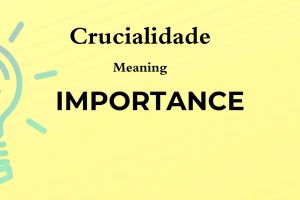If you are searching for the exact meaning of “crucialidade“, then your search ends here.
In today’s fast-paced and ever-changing world, it is more important than ever to understand the concept of crucialidade. Whether you are a business owner, a manager, or simply a student, knowing what is crucial to your success can help you to make better decisions and achieve your goals.
This article will discuss the different aspects of crucialidade in more detail. It will also provide tips on how to improve your understanding of the concept and how to apply it to your own work. So whether you are looking to improve your business, your career, or simply your life, read on to learn more about crucialidade and how it can help you to succeed.
Define “Crucialidade” and its significance.
Crucialidade is a Portuguese word that means “cruciality” or “importance.” It is a concept that is often used in business, management, and other fields to refer to the importance of something. The crucialidade of something can be determined by its impact on the overall success of a project or organization.

The concept of crucialidade.
It is important to understand the concept of crucialidade because it can help you to make better decisions about how to allocate your resources. By understanding what is crucial to the success of your project or organization, you can focus your efforts on those areas and avoid wasting time and money on things that are not important.
A brief overview of the article’s content.
The rest of the article will discuss the different aspects of crucialidade in more detail. It will also provide tips on how to improve your understanding of the concept and how to apply it to your own work.
I. The Role of Crucialidade in Decision Making
II. Identifying Crucialidade in Various Contexts
III. Psychological Aspect of Recognizing Crucialidade
iV. Historical Examples of Crucialidade
V. Navigating Challenges through Crucialidade
VI. Cultural Perspectives on Crucialidade and others.
The Role of Crucialidade in Decision Making
The importance of something is often a key factor in decision making. When we are faced with a decision, we need to weigh the importance of the different options available to us. The more important an option is, the more likely we are to choose it.

Explain how recognizing crucialidade influences choices.
Crucialidade can be a difficult concept to measure, but it is important to try to do so when making decisions. By recognizing the crucialidade of different options, we can make more informed choices that are more likely to lead to success.
Provide real-world examples of decisions affected by crucialidade.
There are many real-world examples of decisions that are affected by crucialidade. For example, a business owner might need to decide whether to invest in a new marketing campaign. The success of the business depends on the success of the campaign, so the decision is crucial.
Another example is a doctor who needs to decide whether to operate on a patient. The patient’s life depends on the decision, so it is crucial that the doctor make the right choice.
Discuss the challenges of making decisions based on crucialidade.
Making decisions based on crucialidade can be challenging. There are often many factors to consider, and it can be difficult to weigh the importance of each one. Additionally, there is always the risk of making the wrong decision.
Provide tips for making decisions based on crucialidade.
Despite the challenges, it is important to try to make decisions based on crucialidade. Here are a few tips:
* Gather as much information as possible.
* Identify the key factors that are most important.
* Weigh the pros and cons of each option.
* Get input from others.
* Be prepared to make a tough decision.
Identifying Crucialidade in Various Contexts
In personal relationships, crucialidade can be found in the things that make the relationship strong and meaningful. These things might include trust, communication, respect, and shared values. When these things are present, the relationship is more likely to be successful.

Cruciality in professional settings and career choices.
In professional settings, crucialidade can be found in the things that are essential to the success of the organization. These things might include employee skills and knowledge, customer satisfaction, and financial performance. When these things are strong, the organization is more likely to be successful.
Environmental and societal importance for sustainability.
In the environmental and societal context, crucialidade can be found in the things that are essential to the health of the planet and its inhabitants. These things might include clean air and water, sustainable food production, and climate change mitigation. When these things are protected, the planet and its inhabitants are more likely to thrive.
Discuss the challenges of identifying crucialidade in different contexts.
Identifying crucialidade in different contexts can be challenging. There are often many factors to consider, and it can be difficult to weigh the importance of each one. Additionally, the importance of something can change over time.
Psychological Aspect of Recognizing Crucialidade

The cognitive process behind evaluating importance is complex and involves a number of different factors. These factors include:
* Our attention: We are more likely to attend to things that we perceive as important.
* Our emotions: Our emotions can also influence our perception of importance. For example, we are more likely to perceive something as important if it makes us feel happy or excited.
* Our beliefs: Our beliefs about the world can also influence our perception of importance. For example, if we believe that something is essential for our survival, we are more likely to perceive it as important.
Impact of cognitive biases on assessing cruciality.
Cognitive biases are errors in thinking that can affect our judgment. There are a number of cognitive biases that can impact our assessment of crucialidade, including:
* The availability heuristic: This bias leads us to judge the importance of something based on how easily examples of it come to mind. For example, we might be more likely to judge a disease as important if we have recently heard about a lot of people who have been diagnosed with it.
* The anchoring bias: This bias leads us to be influenced by the first piece of information that we receive. For example, if we are told that a new drug is 90% effective, we are more likely to judge it as important than if we are told that it is only 50% effective.
* The confirmation bias: This bias leads us to seek out information that confirms our existing beliefs and to ignore information that contradicts them. For example, if we believe that a particular political candidate is the best choice, we are more likely to read articles that support that belief and to ignore articles that criticize the candidate.
Strategies to enhance accurate recognition of crucialidade.
There are a number of strategies that can be used to enhance accurate recognition of crucialidade. These strategies include:
* Being aware of cognitive biases: The first step is to be aware of the cognitive biases that can affect our judgment. Once we are aware of these biases, we can be more mindful of them and try to avoid them.
* Gathering more information: The more information we have about something, the more likely we are to make an accurate assessment of its importance.
* Seeking out different perspectives: It is important to consider different perspectives when evaluating the importance of something. This can help us to avoid being influenced by our own biases.
* Thinking critically: We should always think critically about the information that we are presented with. This means evaluating the source of the information, the methods used to collect it, and the conclusions that are drawn from it.Historical Examples of Crucialidade
There are many historical events that have been shaped by the recognition of importance. For example, the decision to declare independence from Great Britain was a crucial one for the United States. The Founding Fathers recognized the importance of independence, and they were willing to fight for it.

Another example is the decision to launch the Apollo 11 mission to the moon. This was a crucial decision that required the recognition of the importance of space exploration. The decision to launch the mission was a gamble, but it paid off in the end.
Turning points in history influenced by crucialidade.
There are also many turning points in history that have been influenced by crucialidade. For example, the invention of the printing press was a turning point that allowed for the spread of information and ideas. The printing press made it possible for people to learn about different cultures and perspectives, which had a profound impact on the course of history.
Another turning point is the fall of the Berlin Wall. This was a crucial event that marked the end of the Cold War. The fall of the Berlin Wall was a result of the recognition of the importance of freedom and democracy.
Lessons learned from past decisions and their outcomes.
We can learn a lot from past decisions and their outcomes. For example, we can learn that it is important to be aware of the cognitive biases that can affect our judgment. We can also learn that it is important to gather as much information as possible before making a decision.
Another lesson is that it is important to consider different perspectives when evaluating the importance of something. We should also think critically about the information that we are presented with.
By learning from past decisions and their outcomes, we can make better decisions in the future.
Navigating Challenges through Crucialidade
Recognizing the importance of something can help us to solve problems in a number of ways. First, it can help us to identify the root cause of the problem. Once we know the root cause, we can start to develop solutions that address it.

Second, recognizing importance can help us to prioritize our efforts. When we have a lot of problems to solve, it is important to focus on the most important ones first. This will help us to make the most progress and to avoid wasting time on less important problems.
Third, recognizing importance can help us to make better decisions. When we are faced with a difficult decision, we can use the importance of the different options to help us make the best choice.
Overcoming challenges by prioritizing cruciality.
When we are faced with a challenge, it is important to prioritize the crucialidade of the different aspects of the challenge. This will help us to focus our efforts on the most important things and to avoid wasting time on things that are not as important.
For example, if we are trying to lose weight, we might prioritize the crucialidade of eating healthy foods and exercising regularly. We might also prioritize the crucialidade of setting realistic goals and staying motivated.
By prioritizing the crucialidade of the different aspects of the challenge, we can increase our chances of success.
Balancing multiple factors when assessing importance.
When assessing the importance of something, it is important to balance multiple factors. These factors might include the impact of the thing, the likelihood of it happening, and the cost of addressing it.
For example, we might assess the importance of a potential natural disaster by considering the impact of the disaster, the likelihood of it happening, and the cost of mitigating the disaster.
By balancing multiple factors when assessing importance, we can make more informed decisions about how to allocate our resources.
Also Read: Indigenous North American Stickball
Cultural Perspectives on Crucialidade
The concept of importance is a cultural and societal construct. This means that the things that are considered important vary from culture to culture and society to society.

For example, in some cultures, family is considered to be the most important thing in life. In other cultures, work or education might be considered to be more important.
The things that are considered important are also influenced by the values of the culture or society. For example, in a culture that values cooperation, teamwork might be considered to be more important than individual achievement.
Cultural variations in recognizing significance.
There are also cultural variations in how people recognize significance. For example, in some cultures, people might express their importance through material possessions. In other cultures, people might express their importance through their relationships or their contributions to society.
The role of rituals and traditions in emphasizing importance.
Rituals and traditions can also play a role in emphasizing importance. For example, in many cultures, there are rituals that are associated with birth, death, and marriage. These rituals help to remind people of the importance of these events.
Teaching Crucialidade: Education and Awareness
Education can play a role in teaching importance assessment by providing students with the tools and knowledge they need to make informed decisions. This can be done by teaching students about the different factors that can influence the importance of something, such as the impact, likelihood, and cost.

Education can also help students to develop the skills they need to assess importance, such as critical thinking and problem-solving. By teaching students about importance assessment, we can help them to make better decisions in their personal and professional lives.
Raising awareness about recognizing cruciality.
In addition to education, it is also important to raise awareness about the importance of recognizing crucialidade. This can be done through public awareness campaigns, social media, and other channels.
By raising awareness about crucialidade, we can help people to understand the importance of assessing the importance of things and to make better decisions in their lives.
Incorporating crucialidade into curricula and learning.
Crucialidade can also be incorporated into curricula and learning in a number of ways. For example, it can be a topic of study in its own right, or it can be integrated into other subjects, such as math, science, and social studies.
By incorporating crucialidade into curricula and learning, we can help students to develop the skills and knowledge they need to assess importance and to make better decisions in their lives.
FAQs about Crucialidade (Importance)
Here are some FAQs about Crucialidade (Importance):
- How is “crucialidade” different from regular importance?
The Portuguese word “crucialidade” can be translated as “importance” or “cruciality.” However, it is often used to refer to the importance of something in a specific context or situation. For example, the crucialidade of a particular decision might depend on the goals of the decision-maker and the available resources.
- Can crucialidade be subjective?
Yes, crucialidade can be subjective. The importance of something can vary depending on the individual’s perspective, values, and goals. For example, one person might consider family to be the most important thing in life, while another person might consider work to be more important.
- Are there cultural differences in evaluating importance?
Yes, there are cultural differences in evaluating importance. The things that are considered important vary from culture to culture and society to society. For example, in some cultures, family is considered to be the most important thing in life, while in other cultures, work or education might be considered to be more important.
- What cognitive biases can affect our perception of crucialidade?
There are a number of cognitive biases that can affect our perception of crucialidade. These biases include:
* The availability heuristic: This bias leads us to judge the importance of something based on how easily examples of it come to mind. For example, we might be more likely to judge a disease as important if we have recently heard about a lot of people who have been diagnosed with it.
* The anchoring bias: This bias leads us to be influenced by the first piece of information that we receive. For example, if we are told that a new drug is 90% effective, we are more likely to judge it as important than if we are told that it is only 50% effective.
* The confirmation bias: This bias leads us to seek out information that confirms our existing beliefs and to ignore information that contradicts them. For example, if we believe that a particular political candidate is the best choice, we are more likely to read articles that support that belief and to ignore articles that criticize the candidate.
- How can understanding cruciality improve decision making?
Understanding crucialidade can improve decision making by helping us to identify the most important factors to consider when making a decision. By understanding the crucialidade of different factors, we can make more informed decisions that are more likely to lead to success.
- Are there historical examples where crucialidade played a pivotal role?
Yes, there are many historical examples where crucialidade played a pivotal role. For example, the decision to declare independence from Great Britain was a crucial one for the United States. The Founding Fathers recognized the importance of independence, and they were willing to fight for it.
Another example is the decision to launch the Apollo 11 mission to the moon. This was a crucial decision that required the recognition of the importance of space exploration. The decision to launch the mission was a gamble, but it paid off in the end.
These are just a few examples of how crucialidade can play a pivotal role in history. By understanding the crucialidade of different factors, we can make better decisions that can shape the course of history.
I hope this helps!
